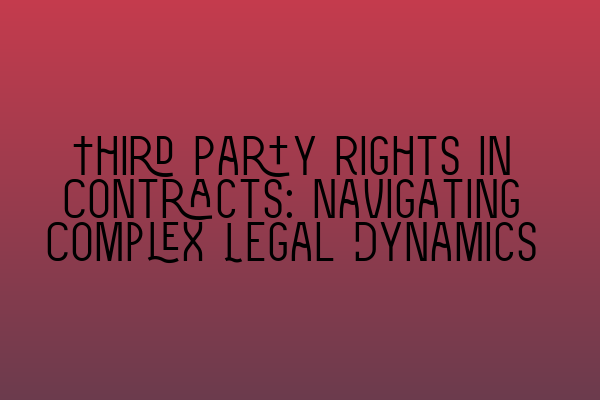Third Party Rights in Contracts: Navigating Complex Legal Dynamics
Contracts play a vital role in business transactions and personal agreements, serving as the foundation for legally binding obligations and expectations. Contract law is a multifaceted area, encompassing a wide range of legal principles and concepts. One such concept is third party rights in contracts, which can introduce intricate legal dynamics and must be carefully navigated to ensure compliance and protect the interests of all parties involved.
In this article, we will delve into the complexities of third party rights in contracts, exploring the various aspects and implications that arise in this legal context. Whether you are a solicitor, a law student preparing for the Solicitors Qualifying Examination (SQE), or someone seeking a deeper understanding of contract law, this article is designed to provide valuable insights.
Before delving into the nuances of third party rights, it is crucial to have a clear understanding of what constitutes a contract. In simple terms, a contract is an agreement between two or more parties that creates legally enforceable obligations. Contracts can be written or verbal, but written contracts are generally preferred as they provide an objective record of the terms agreed upon.
Now let’s explore the concept of third party rights in contracts. Traditionally, the general principle in contract law is that only parties to a contract have rights and obligations arising from it. This means that, in most situations, a third party (someone who is not a party to the contract) cannot enforce the terms of the contract or claim any benefits from it.
However, there are certain exceptions to this general rule that allow third parties to acquire enforceable rights in specific circumstances. These exceptions typically arise through two mechanisms: statutory provisions and common law doctrines.
Statutory provisions are legislation enacted by the government that specifically grant third parties rights to enforce certain types of contracts. One example of such legislation is the Contracts (Rights of Third Parties) Act 1999 in the United Kingdom. This Act allows third parties to enforce contract terms that confer benefits directly on them, even if they are not named as parties to the contract.
On the other hand, common law doctrines are legal principles established and developed by courts through case law. These doctrines create exceptions to the general rule by recognizing situations where third parties can enforce contractual rights. The most well-known common law doctrine in this context is the doctrine of privity of contract.
The doctrine of privity of contract states that only parties to a contract can enforce it, while third parties are unable to do so. However, this strict principle has been gradually relaxed through various exceptions developed by courts over time. These exceptions include agency relationships, assignment of rights, and trust arrangements.
Agency relationships occur when one party (the agent) acts on behalf of another party (the principal) to enter into a contract with a third party. In such cases, the third party may be able to enforce the contract against the principal, despite not being a party to the contract themselves.
Assignment of rights is another mechanism through which a third party may acquire enforceable rights in a contract. This occurs when a party transfers their rights under a contract to a third party. However, it is important to note that the assignment must be valid and legally recognized for the third party to enforce the contract.
Trust arrangements can also give rise to third party rights in contracts. A trust is a legal arrangement in which one party (the trustee) holds property or assets for the benefit of another party (the beneficiary). In certain situations, the beneficiary may be able to enforce the terms of a contract that the trustee has entered into.
It is evident that third party rights in contracts introduce complex legal dynamics that require careful consideration. As a solicitor, it is essential to navigate these complexities to ensure that your clients are aware of their rights and obligations, as well as any potential risks or liabilities arising from third party involvement.
For law students preparing for the SQE, understanding third party rights in contracts is crucial for success in the examination. The SQE assesses candidates’ knowledge and understanding of contract law and its application in real-world scenarios. Therefore, having a comprehensive grasp of third party rights will enable you to tackle SQE questions effectively and demonstrate your legal competence.
To further enhance your preparation for the SQE, we recommend exploring the following related articles:
- Top Resources for SQE Preparation: Tools to Help You Succeed
- SQE Mock Debrief Sessions: Analyzing Your Performance for Growth
- The Importance of Mocks in SQE Preparation: A Game Changer
- SQE Answer Keys: Unraveling the Mystery of Correct Answers
- Unveiling the Solicitors Qualifying Examination (SQE): What You Need to Know
In conclusion, third party rights in contracts are a fascinating and complex aspect of contract law. While the general rule is that only parties to a contract can enforce it, statutory provisions and common law doctrines provide exceptions that enable third parties to acquire enforceable rights. Navigating these legal dynamics requires expertise and a thorough understanding of the relevant legislation and case law. By staying abreast of the latest developments in contract law and the implications of third party rights, solicitors can provide effective legal advice and ensure their clients’ interests are protected.
